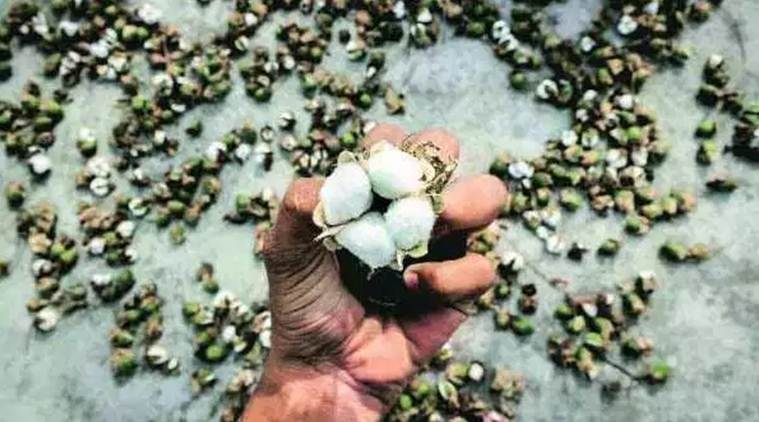 Bt cotton remains the only GM crop allowed to be cultivated in the country.
Bt cotton remains the only GM crop allowed to be cultivated in the country.
Last week, a group of more than 1,000 farmers gathered in a village in Akola of Maharashtra to sow seeds of an unapproved, genetically modified variety of cotton, defying government regulations. The government is now investigating what was planted.
The event was organised by Shetkari Sanghtana, a farmers’ union once led by the late Sharad Joshi. About two decades ago, Joshi had led a campaign for the introduction of genetically modified food crops. The campaign played a major role in the approval for Bt cotton, a transgenic variety of cotton.

What is allowed
Bt cotton remains the only GM crop allowed to be cultivated in the country. Developed by US giant Bayer-Monsanto, it involves insertion of two genes viz ‘Cry1Ab’ and ‘Cry2Bc’ from the soil bacterium Bacillus thuringiensis into cotton seeds. This modification codes the plant to produce protein toxic to Heliothis bollworm (pink bollworm) thus making it resistant to their attack. The commercial release of this hybrid was sanctioned by the government in 2002.
In India, it is the responsibility of the Genetic Engineering Appraisal Committee (GEAC) under the Environment Ministry to assess the safety of a genetically modified plant, and decide whether it is fit for cultivation. The GEAC comprises experts and government representatives, and a decision it takes has to be approved by the Environment Minister before any crop is allowed for cultivation.
Besides Bt cotton, the GEAC has cleared two other genetically modified crops — brinjal and mustard — but these have not received the consent of the Environment Minister.
The variety now sown
The farmers in Akola planted a herbicide-tolerant variety of Bt cotton. This variety (HtBt) involves the addition of another gene, ‘Cp4-Epsps’ from another soil bacterium, Agrobacterium tumefaciens. It is not cleared by GEAC. The farmers claim that the HtBt variety can withstand the spray of glyphosate, a herbicide that is used to remove weeds, and thus it substantially saves them de-weeding costs. Farmers spend around Rs 3,000-5,000 per acre for de-weeding. Along with the uncertainty in finding labour, de-weeding threatens economic viability of their crops, they say.
READ | Maharashtra: Environment Ministry seeks report on GM crop sowing in state
Why it’s a concern
Story continues below this ad
Genetic changes made in a plant can make it unsafe for consumption, have adverse impacts on human or animal health, or introduce problems in the soil or neighbouring crops. There is an elaborate process of tests and field trials to be followed. Critics of GM technology argue that some traits of genes start expressing themselves only after several generations, and thus one can never be sure about their safety.
What the law says
Legally, sale, storage, transportation and usage of unapproved GM seeds is a punishable offence under the Rules of Environmental Protection Act 1989. Also, sale of unapproved seeds can attract action under the Seed Act of 1966 and the Cotton Act of 1957. The Environmental Protection Act provides for a jail term of five years and a fine of Rs 1 lakh for violation of its provisions, and cases can be filed under the other two Acts.
Farmers who assembled in Akola alleged that the HtBt variety is being surreptitiously used by farmers across the country, smuggled from abroad. Maharashtra’s Commissioner of Agriculture has registered 10 police cases and impounded 4,516 packets of HtBt seeds this year alone.
 Want the latest Explained news on WhatsApp? Join the #ExpressExplained WhatsApp group. Scan this if you’re on a desktop or simply tap the image if you’re using a mobile device.
Want the latest Explained news on WhatsApp? Join the #ExpressExplained WhatsApp group. Scan this if you’re on a desktop or simply tap the image if you’re using a mobile device.
What next
Story continues below this ad
Akola’s District Collector has assured that farmers will not face any action but organisers of the event would be acted against. The district administration has sent samples of the sown seeds to a laboratory in Nagpur to verify whether they were indeed an unapproved GM variety. The Environment Ministry has written to the state government seeking a factual report on the incident.

 Bt cotton remains the only GM crop allowed to be cultivated in the country.
Bt cotton remains the only GM crop allowed to be cultivated in the country.
 Want the latest Explained news on WhatsApp? Join the #ExpressExplained WhatsApp group. Scan this if you’re on a desktop or simply tap the image if you’re using a mobile device.
Want the latest Explained news on WhatsApp? Join the #ExpressExplained WhatsApp group. Scan this if you’re on a desktop or simply tap the image if you’re using a mobile device.




































